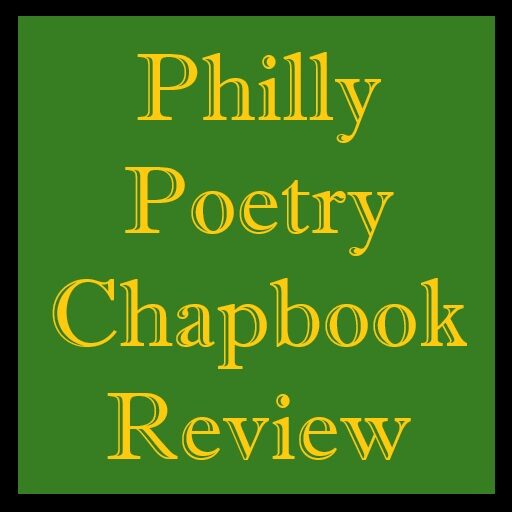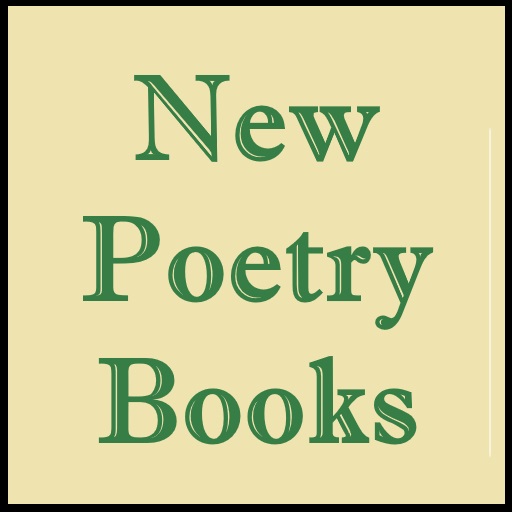We here at Philly Poetry Chapbook Review love poetry, whether it’s in chapbooks or full-length collections. We have a hunch that our readers do, too. Every Tuesday, we’ll be publishing an update about what poetry titles we know are publishing in the following week.
Information, including product descriptions, are provided by the publisher. If we cover the book on this site, links will be included.
Chapbooks
Pilgrimage, Deborah A. Miranda
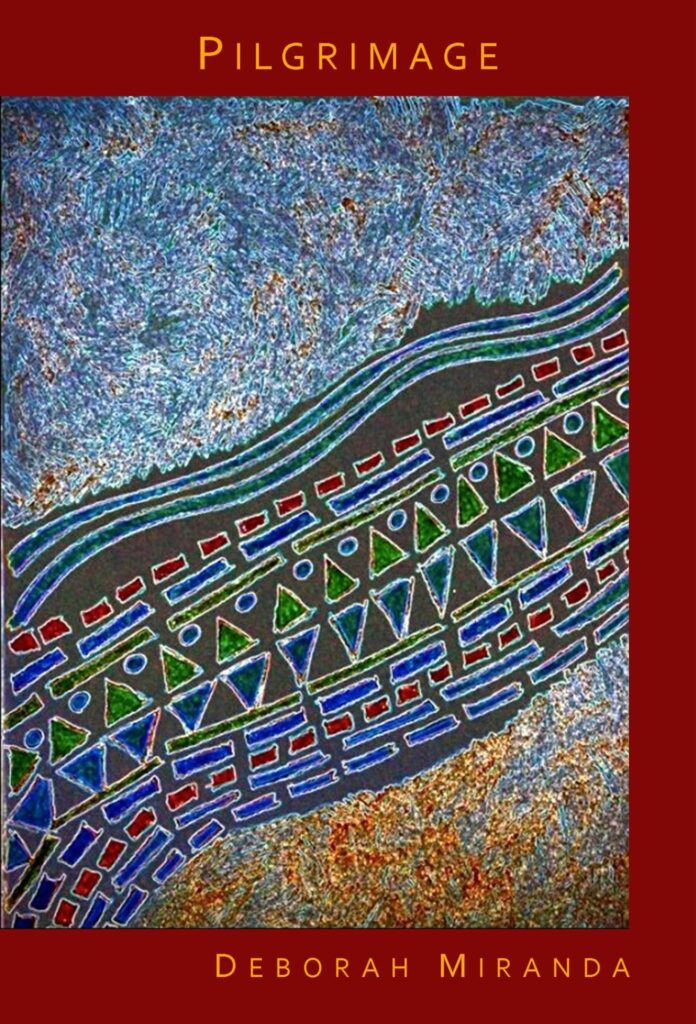
Publisher: Seven Kitchens Press
Publication date: 1/6/2024
Format: Paperback
No description found.
Deborah A. Miranda is an enrolled member of the Ohlone-Costanoan Esselen Nation of the Greater Monterey Bay Area in California and Santa Ynez Chumash lineage. Her mixed-genre book Bad Indians: A Tribal Memoir (Heyday 2013), received the 2015 PEN-Oakland Josephine Miles Literary Award, a Gold Medal from the Independent Publishers Association, & was short-listed for the William Saroyan Literary Award. She is also the author of four poetry collections (Indian Cartography, The Zen of La Llorona, Raised by Humans, and Altar for Broken Things). Deborah lives in Eugene, Oregon with her wife Margo and a variety of rescue dogs. She is Professor Emerita of English at Washington and Lee University, where she taught literature of the margins and creative writing.
Full-length
How to Be a Good Savage, Mikeas Sánchez, Wendy Call, Shook
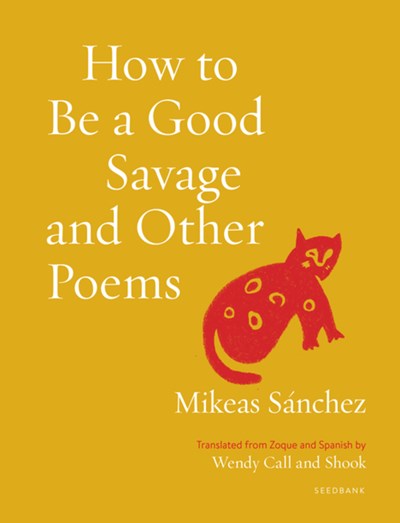
Publisher: Milkweed Editions
Publication date: 1/9/2024
Format: Paperback
In a fiercely personal yet authoritative voice, prolific contemporary poet Mikeas Sánchez explores the worldview of the Zoque people of southern Mexico. Her paced, steely lyrics fuse cosmology, lineage, feminism, and environmental activism into a singular body of work that stands for the self and the collective in the same instant. “I am woman and I celebrate every vein,” she writes, “where I guard my ancestors’ secrets / every Zoque man’s word in my mouth / every Zoque woman’s wisdom in my spit.”
How to Be a Good Savage and Other Poems examines the intersection of Zoque struggles against colonialism and empire, and those of North African immigrants and refugees. Sánchez encountered the latter in Barcelona as a revelation, “spreading their white blankets on the ground / as if they’ll soon return to sea / flying the sail of the promised land / the land that became a mirage.” Other works bring us just as close to similarly imperiled relatives, ancestors, gods, and archetypal Zoque men and women that Sánchez addresses with both deeply prophetic and childlike love.
Coming from the only woman to ever publish a book of poetry in Zoque and Spanish, this timely, powerful collection pairs the bilingual originals with an English translation for the first time. This book is for anyone interested in poetry as knowledge, proclaimed with both feet squarely set on ancient ground.
Mikeas Sánchez is the author of How to Be a Good Savage and Other Poems. She is one of the most important poets of the Indigenous Americas, working in Zoque, a language spoken in southern Mexico. She is the only woman to have ever published a book of poetry in that language. Her six volumes of poetry-including Mokaya / Mojk’Jäyä and Mumure’ tä’ yäjktambä / Todos somos cimarrones-are all bilingual Spanish-Zoque. Sánchez’s work has been translated into Bangla, Catalan, English, German, Italian, Maya, Mixe, and Portuguese. In Chiapas, Mexico, she was awarded first place in the “Y el Bolóm dice . . .” Prize for Fiction as well as the Pat O’tan Prize for Indigenous Poetry. Sánchez is a radio producer, translator, community health promoter, and defender of Zoque lands. She lives in Ajway, Chiapas.
Wendy Call is co-editor of Telling True Stories: A Nonfiction Writers’ Guide and Best Literary Translations, author of the award-winning No Word for Welcome, and translator of two collections of poetry by Mexican-Zapotec poet Irma Pineda: In the Belly of Night and Other Poems and Nostalgia Doesn’t Flow Away Like Riverwater. Her literary projects have been supported by Artist Trust, the Fulbright Commission, and the National Endowment for the Arts. Call serves on the faculty of the Rainier Writing Workshop MFA program and lives in Seattle, on Duwamish land, and in Oaxaca, Mexico, on Mixtec and Zapotec land.
Shook is a poet, translator, and editor whose work has spanned a wide range of languages and places. Their writing has appeared in Poetry, World Literature Today, the Guardian, and many other publications, as well as being translated into more than a dozen languages, including Isthmus Zapotec, Kurdish, and Uyghur. Since founding Phoneme Media in 2013, Shook has edited and published translations from over thirty-five languages. Today they direct Kashkul Books, a publishing project based in the Kurdistan Region of Iraq, as well as the translation-focused imprint avión at Gato Negro Ediciones in Mexico City. They reside at Newt Beach in Northern California.
Besaydo, Yalie Saweda Kamara
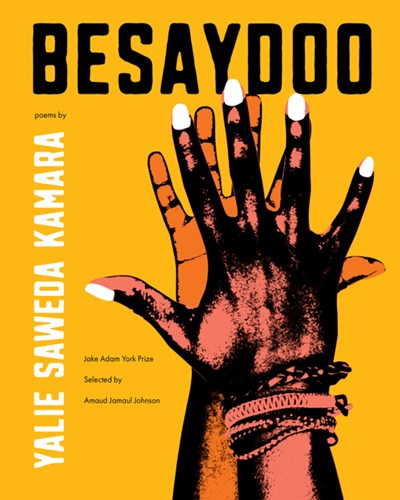
Publisher: Milkweed Editions
Publication date: 1/9/2024
Format: Paperback
A griot is a historian, a living repository of communal legacies with “a story pulsing in every blood cell.” In Besaydoo, Kamara serves as griot for the Freeborn in Oakland, the Sierra Leonean in California, the girl straddling womanhood, the woman re-discovering herself. “I am made from the obsession of detail,” she writes, setting scenes from her own multifaceted legacy in sharp relief: the memory of her mother’s singing, savory stacks of lumpia, a church where “everyone is broken, but trying.” A multitudinous witness.
Kamara psalms from the nexus of many languages—Krio, English, French, poetry’s many dialects—to highlight mechanisms not just for survival, but for abundance. “I make myth for peace,” she writes, as well as for loss, for delight, for kinship, and most of all for a country where Black means “steadfast and opulent,” and “dangerous and infinite.” She writes for a new America, where praise is plentiful and Black lives flourish.
But in Besaydoo, there is no partition between the living and the dead. There is no past nor present. There is, instead, a joyful simultaneity—a liberating togetherness sustained by song.
Yalie Saweda Kamara is a Sierra Leonean American writer, educator, and researcher from Oakland, California. Selected as the 2022-2023 Cincinnati and Mercantile Library Poet Laureate (2-year term) and a 2023 Academy of American Poets Laureate Fellow, she is the editor of the anthology What You Need to Know About Me: Young Writers on Their Experience of Immigration and the author of the chapbooks A Brief Biography of My Name and When the Living Sing. Kamara earned a PhD in Creative Writing and English Literature from the University of Cincinnati. She is an assistant professor of English at Xavier University and resides in Cincinnati.
I Think We’re Alone Now, Abigail Parry
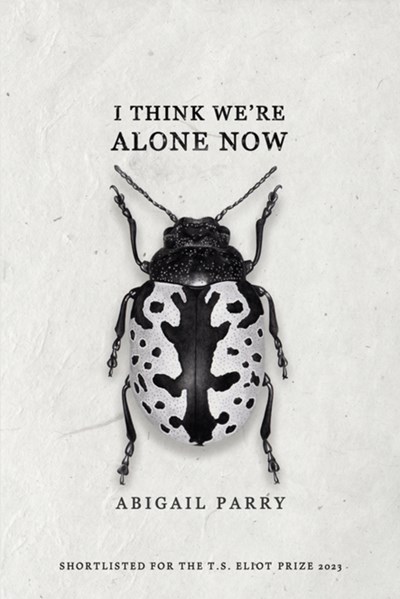
Publisher: Bloodaxe Books
Publication date: 1/9/2024
Format: Paperback / eBook
This was supposed to be a book about intimacy: what it might look like in solitude, in partnership, and in terms of collective responsibility. Instead, the poems are preoccupied with pop music, etymology, surveillance equipment and cervical examination, church architecture and beetles. Just about anything, in fact, except what intimacy is or looks like.
So this is a book that runs on failure, and also a book about failures: of language to do what we want, of connection to be meaningful or mutual, and of the analytic approach to say anything useful about what we are to one another. Here are abrupt estrangements and errors of translation, frustrations and ellipses, failed investigations. And beetles.
Abigail Parry’s first collection, Jinx (Bloodaxe Books, 2018), was shortlisted for the Forward Prize for Best First Collection 2018 and the Seamus Heaney Centre First Collection Poetry Prize 2019. I Think We’re Alone Now is shortlisted for the 2023 T.S. Eliot Prize.
Abigail Parry spent seven years as a toymaker before completing her doctoral thesis on wordplay. Her poems have been set to music, translated into Spanish and Japanese, broadcast on BBC and RTÉ Radio, and widely published in journals and anthologies. She has won a number of prizes and awards for her work, including the Ballymaloe Prize, the Troubadour Prize, and an Eric Gregory Award. Her first collection, Jinx, published by Bloodaxe Books in 2018, was shortlisted for the Forward Prize for Best First Collection 2018 and the Seamus Heaney Centre First Collection Poetry Prize 2019. Her second collection, I Think We’re Alone Now, (Bloodaxe Books, 2023) is shortlisted for the 2023 T.S. Eliot Prize. She is currently a lecturer in creative writing at Cardiff University.
To the Letter, Tomasz Rozycki, Mira Rosenthal
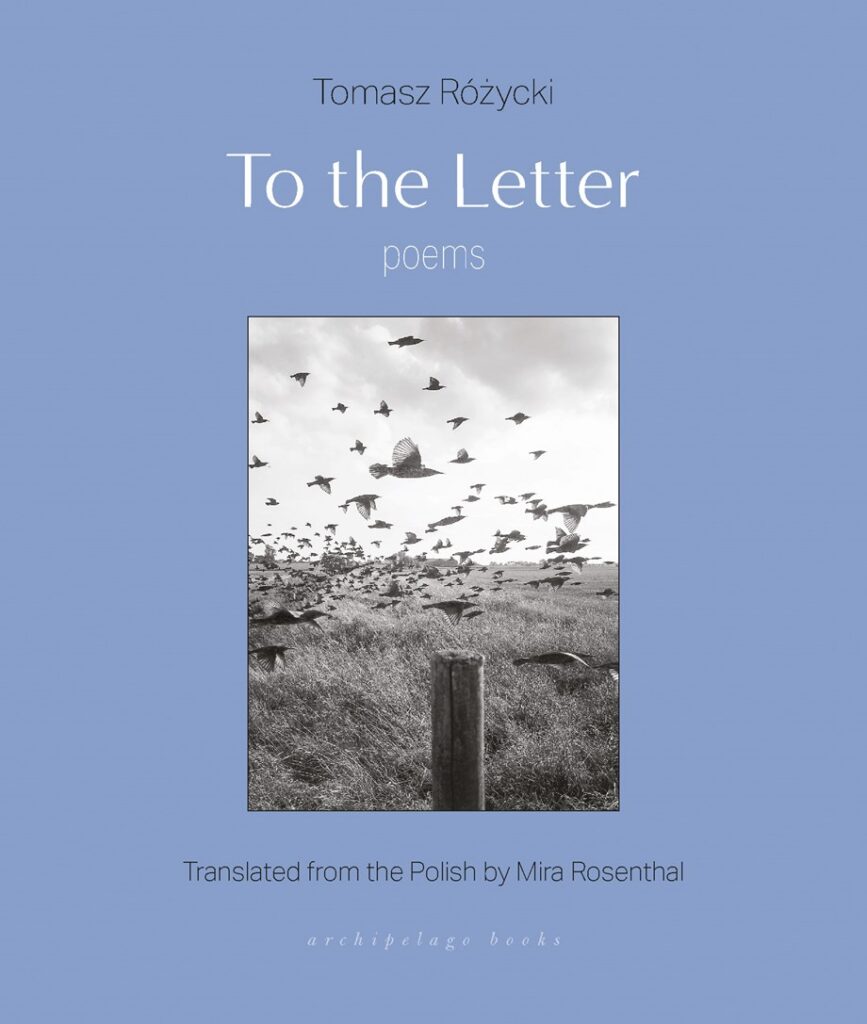
Publisher: Archipelago
Publication date: 1/9/2024
Format: Paperback / eBook
Różycki collects moments of illumination – a cat dashing out of a window and “feral sun” streaking in, a body planting itself in the ground like rhubarb and flowering. He collects and collects, opens a crack, and clutches a shrapnel of epiphany.
Tomasz Różycki’s To the Letter follows Lieutenant Anielewicz on the hunt for any clues that might lead 21st century human beings out of a sense of despair. With authoritarianism rising across Eastern Europe, the Lieutenant longs for a secret hero. At first, he suspects some hidden mechanism afoot: fruit tutors him in the ways of color, he drifts out to sea to study the grammar of tides, or he gazes at the sun as it thrums away like a timepiece. In one poem, he admits “this is the story of my confusion,” and in the next the Lieutenant is back on the trail. “This lunacy needs a full investigation,” he jibes.
He wants to get to the bottom of it all, but he’s often bewitched by letters and the trickery of language. Diacritics on Polish words form a “flock of sooty flecks, clinging to letters” and Lieutenant Anielewicz studies the tails, accents, and strokes that twist this script.
While the Lieutenant can’t write a coherent code to solve life’s mysteries or to fill the absence of a country rent by war, his search for patterns throughout art, philosophy, and literature lead not to despair but to an affirmation of the importance of human love.
Tomasz Różycki is the author of eleven volumes of poetry and prose. Over the last decade he has garnered almost every prize Poland has to offer as well as widespread critical acclaim, with work translated into numerous languages and frequent appearances at international festivals. In the U.S., he has been featured at the Unterberg Poetry Center, the Princeton Poetry Festival, and the Brooklyn Book Festival. His volume Colonies (translated by Mira Rosenthal) won the Northern California Book Award and was a finalist for numerous other prizes, including the International Griffin Poetry Prize and the Oxford-Weidenfeld Translation Prize.
Mira Rosenthal is the author of The Local World, which won the Wick Poetry Prize. She is the recipient of a National Endowment for the Arts Fellowship and Stanford University’s Stegner Fellowship, and her work appears regularly in such journals as Poetry, Ploughshares, Threepenny Review, Guernica, Harvard Review, New England Review, A Public Space, and Oxford American. Her honors include a PEN/Heim Translation Fund Award, a Fulbright Fellowship, a grant from the American Council of Learned Societies, and residencies at Hedgebrook and MacDowell. She teaches creative writing at Cal Poly and lives on the central coast of California.
To Abandon Wizardry, Matthew Carley

Publisher: Bloodaxe Books
Publication date: 1/9/2024
Format: Paperback
To Abandon Wizardry, Matthew Caley’s seventh collection, speeds through a world where it’s harder and harder to tell what’s ‘real’ and what’s not. Where our political and cultural reality seems so unbelievable, we search for a plot and find one that comes from the Harry Potter playbook.
Our sky proves CGI, our touchstones AI. Our screens full of wonders, our streets full of decay. We could nod at Deep Fake, QAnon, fake news versus the ‘truth’ of official news, all manner of waning national myth or ponder the elsewhere we always think of escaping to, that will no doubt prove equally illusory. Set within this almost parallel world, To Abandon Wizardry features a long central poem where someone enjoys an alfresco Americano in Shadwell, London, while in dialogue with a mesh-protected sapling that transmits all the polyglot talk of the city. Either side of this we encounter revenants, disembowelled wizards, talking horses and flying houses.
To Abandon Wizardry forges its aesthetic out of the simulation, hyper-association, and over-stimulation of living in the 21st Century. And it’s all true.
Matthew Caley’s Thirst (Slow Dancer, 1999) was shortlisted for the Forward Prize for Best First Collection, and followed by The Scene of My Former Triumph (Wrecking Ball Press, 2005), Apparently (Bloodaxe Books, 2010); his lost second collection, Professor Glass (Donut Press, 2011); and his later collections, Rake (Bloodaxe Books, 2016), Trawlerman’s Turquoise (Bloodaxe Books, 2019) and To Abandon Wizardry (Bloodaxe Books, 2023). His work has been included in many anthologies, including Roddy Lumsden’s Identity Parade (Bloodaxe Books, 2010) and John Stammers’ Picador Book of Love Poems. He has also co-edited Pop Fiction: The Song in Cinema with Stephen Lannin (Intellect, 2005). He lives in London with artist Pavla Alchin and their two daughters.
What Will People Say, Taniya Gupta
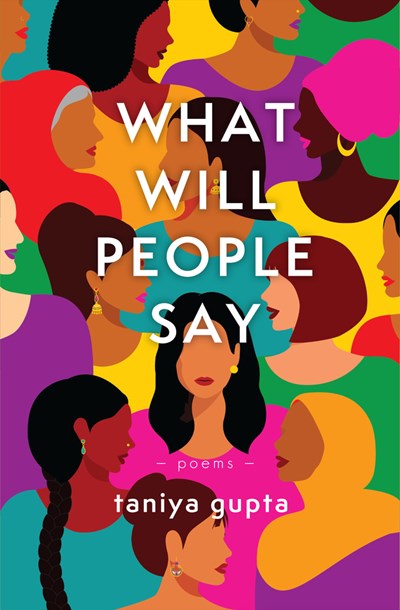
Publisher: Central Avenue Publishing
Publication date: 1/9/2024
Format: Paperback / eBook
From a leading publisher of bestselling modern poetry comes a debut collection by an Indo-Canadian poet written for those trapped in a patriarchal family structure. It grapples with trauma and mental health and challenges the taboo inherent in a culture of victim-blaming.
I had to fight for my existence before I was even out of my mother’s womb.
If I didn’t stop fighting then, why would I stop now?
What Will People Say follows a South Asian woman’s journey through being a daughter, and later a daughter-in-law, within the strict confines of her patriarchal family. Readers watch as the narrator navigates life, trying to find a safe place for herself, until she finally becomes her own hero.
Grappling with the subjects of sexual and psychological trauma, as well as mental health, this collection of poetry carves a path beyond the guilt of wondering: “What will people say?”
Taniya Gupta is an Indo-Canadian poet who grew up in Punjab, India and now lives in the suburbs of Toronto, Canada. Her love for poetry started at a very young age when writing her thoughts on paper was the only way she knew how to process her emotions. Now, she writes as a means of healing and connecting with others who may otherwise feel they are alone in their struggles. What Will People Say is her debut collection inspired by not only her own life, but also the women in her family and millions of others trapped in patriarchal family structures. Outside of poetry, Taniya loves looking for moments of slowness through yoga and tea.
Canting Arms, Emilian Galaicu-Păun, Adam J. Sorkin, Ilya Kaminsky

Publisher: Phoneme Media
Publication date: 1/9/2024
Format: Paperback / eBook
Canting Arms (the heraldic term refers to coats of arms that are visual puns) is the fitting title for Galaicu-Păun’s selected poems. His style is rich with references at once both playful and thematically serious, ironic, at times comic, and always bristling with verbal energy and unexpected turns in strong, limber lines.. This collection spans his earlier poems with scriptural and erotic references to later, more complex political, historical, psychologically astute works, sardonic, visionary, as well as surprising.
Emilian Galaicu-Păun was born in 1964 in Unchitești, Republic of Moldova. His books of poetry include Lumina proprie (1986), Abece-Dor (1989), Levitații deasupra hăului (1991), Cel bătut îl duce pe cel nebătut (1994), Yin Time (1999), Gestuar (2002), Arme grăitoare (2009), and a career retrospective, A–Z.best(2012). His prose volumes are Gesturi. Trilogia nimicului (1996), Poezia de după poezie. Ultimul deceniu (1999), and Țesut viu: 10 x 10 (2011). His poetry, in Adam J. Sorkin’s collaborative translations, appears in the anthologies Singular Destinies: Contemporary Poets of Bessarabia (2003), A Fine Line: New Poetry from Eastern and Central Europe (2004), New European Poets (2008), and Born in Utopia: An Anthology of Modern and Contemporary Romanian Poetry(2006); and in the literary journals 3:am, Absinthe: New European Writing, Connotation Press, Orient Express, Poezia, Turbulence, and Poem (forthcoming). Galaicu-Păun is editor-in-chief at Cartier Publishing House, Chișinău, and has won numerous awards in Romania and Moldova. In 2014, the president of Moldova awarded him the Order of Cultural Merit in the Grade of Office. In 2015, he was one of the National Prize laureates of Moldova.
Adam J. Sorkin has published more than fifty books of translation. His work has won the 2005 Poetry Society Prize for European Poetry Translation as well as the International Quarterly Crossing Boundaries Award, the Kenneth Rexroth Memorial Translation Prize, the Ioan Flora Prize for Poetry Translation, and the Poesis Translation Prize, among others. His most recent publications include A Sharp Double-Edged Luxury Object by Rodica Draghincescu (Červená Barva, 2014), translated with Antuza Genescu; Gold and Ivy/Aur și iederă by George Vulturescu (Eikon, 2014), translated with Olimpia Iacob; The Starry Womb by Mihail Gălățanu (Diálogos, 2014), translated with Petru Iamandi and the author; and The Book of Anger by Marta Petreu (Diálogos, 2014), translated with Christina Zarifopol-Illias and Liviu Bleoca. His translation of Floarea Țuțuianu’s Syllables of Flesh is forthcoming from Plamen Press.
Ravage: An Astonishment of Fire, Macgillivray
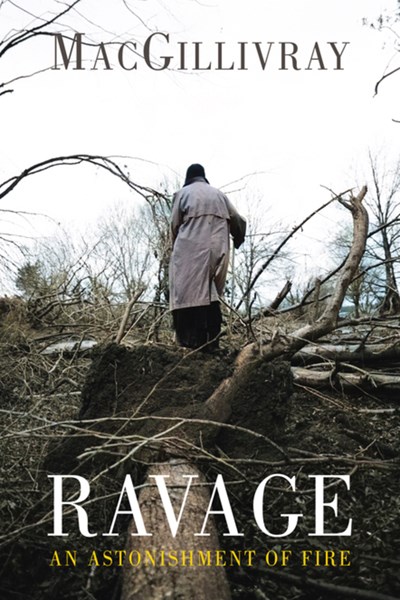
Publisher: Bloodaxe Books
Publication date: 1/9/2024
Format: Paperback
Ravage: An Astonishment of Fire draws together MacGillivray’s extensive research into the life and work of Norwegian-Shetlandic poet Kristján Norge, who vanished from Eilean a’ Bhàis in the Outer Hebrides in 1961. Comprising two previously unpublished manuscripts by Norge, Optik: A History of Ghost(1950) and Ravage (1961), this collection also includes rare original material, giving insight into Norge’s troubled existence and mysterious disappearance.
Through a combination of fragments that include poetry, logbook entries and correspondence between historical figures such as Sir David Brewster and Sir Walter Scott, MacGillivray introduces us to the troubled and mysterious character of Kristján Norge. The book ranges from meditations on Greek optics, to accounts of isolation and demonic transformation on a remote island, to various archival materials including maps and photographs that bring the story of Norge to life.
MacGillivray is the Highland name of writer and artist Kirsten Norrie. Her poetry and multi-disciplinary practice inhabits a rich artistic universe encompassing performance art, song-writing and the use of visual media such as sculpture and photography. She has published three other poetry books, The Last Wolf of Scotland (Red Hen, US, 2013), The Nine of Diamonds: Surroial Mordantless (Bloodaxe Books, 2016) and The Gaelic Garden of the Dead (Bloodaxe Books, 2019). Her non-fiction work, Scottish Lost Boys (as Kirsten Norrie), was published by Stranger Attractor/The MIT Press in 2018. Her other US connections include performing there with many musicians, including Thurston Moore and Arlo Guthrie. She had a fellowship at the Library of Congress which enabled her to spend time with Navajo and Hopi people in Arizona. In one of her performance pieces she walked in a straight line with a dead wolf on her shoulders through the back streets of Vegas into the Nevada desert. The Last Wolf of Scotland told the story of an early Scottish settler who suffered a scalping, and she recorded Sitting Bull’s great grandson reading from the book. She is currently working on an anti-Western, An American Book of the Dead, a novel set in New Mexico and the Scottish Highlands. She has taught at the Universities of Oxford, Cheltenham and Gloucester and Edinburgh College of Art. After living for many years in Edinburgh, she is now based in Oxford.
This Uncertain Voyage, Susan Dworksi Nusbaum
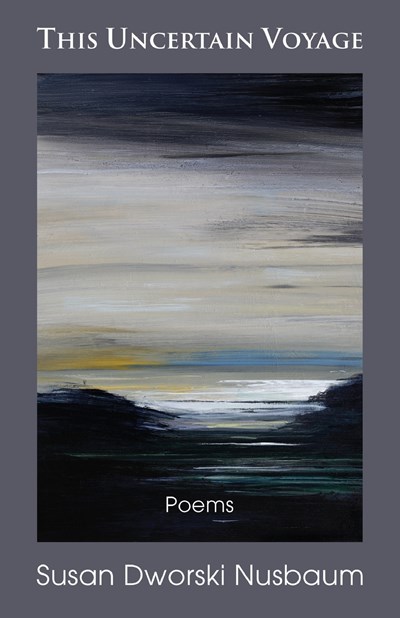
Publisher: Coffeetown Books
Publication date: 1/9/2024
Format: Paperback / eBook
This collection of poems explores the ambiguities of existence by re-visiting personal memories and narratives, and re-imagining the future. Perspectives often change by “taking a second look”-at a photo or familiar work of art, hearing anew a Bach Sarabande, or recalling the strains of a love song. Even news of a scientific discovery, or the rise of hate-filled violence in our country presses us to re-examine long-held assumptions about what we think we know-about family relationships, mortality, political truths, the mysteries of the planet. As fellow voyagers faced with the uncertainty of life, we can see through widened lenses and come away with renewed appreciation for this world-for the goldfinches and magnolias-miracles of this “accidental habitat.”
This is Susan Dworski Nusbaum‘s fourth poetry collection. Her books, What We Take With Us, Open Wide, the Eye, and Alive in This Place, were released by Coffeetown Press in 2014, 2016, and 2019. Born in Rochester, NY, she received a BA from Smith College and a law degree from the University of Buffalo Law School. She lives in Buffalo NY where she raised her family, and worked as a musician, teacher, arts administrator, and most recently as an attorney. Her work has appeared in numerous publications, including The Connecticut River Review, Poetry East, Woven Tale Press, Nimrod International Journal, Chautauqua Literary Journal, Calliope, Chautauqua, Harpur Palate, Wisconsin Review, The Sow’s Ear, A Celebration of Western New York Poets, (2014), The Buffalo News. She has presented her poems in solo public readings in several communities in the Northeast and Florida.
Life on Earth, Dorianne Lux
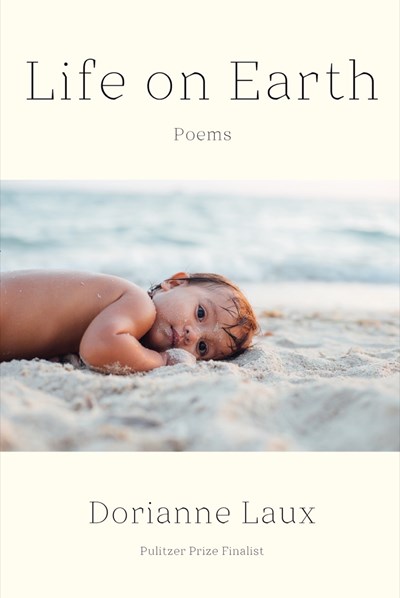
Publisher: W. W. Norton
Publication date: 1/9/2024
Format: Hardcover / eBook
In her seventh collection, Dorianne Laux once again offers poems that move us, include us, and appreciate us fully as the flawed humans we are. Life on Earthis a book of praise for our planet and ourselves, delivered with Laux’s trademark vitality, frank observation, and earthy wisdom.
With odes to the unlikely and elemental—salt, snow, crows, cups, Bisquick, a shovel and rake, the ubiquitous can of WD-40, “the way / it releases the caught cogs / of the world”—Life on Earth urges us all to find extraordinary magic in the mess of ordinary life. “One of our most daring contemporary poets” (Diana Whitney, San Francisco Chronicle), Laux balances wonder at the night sky and the taste of a ripe peach with recognition of the sharp knife of mortality. The volume includes powerful homages to the poet’s mother and her carpenter’s spirit, reflections on loss and aging, and encounters with the fleeting beauty of the natural world.
Transcending life’s inevitable moments of pain and uncertainty, Life on Earth instructs us in our own endless possibilities and the astonishing riches of the world around us.
Dorianne Laux’s poetry collections include Pulitzer Prize finalist Only As the Day Is Long and Paterson Poetry Prize winner The Book of Men. A founding faculty member of Pacific University’s Low-Residency MFA Program, she lives in Richmond, California.
In Parachutes Descending, Tara Jean Welch
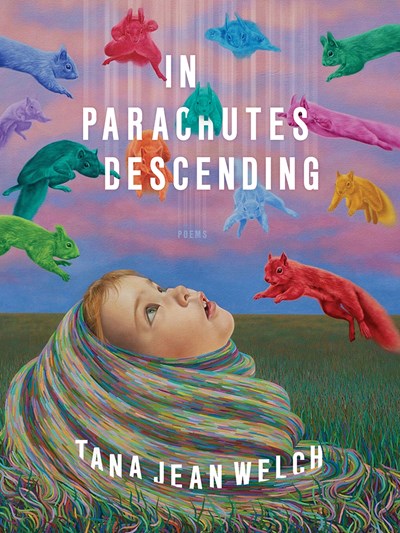
Publisher: University of Pittsburgh Press
Publication date: 1/9/2024
Format: Paperback
In Parachutes Descending follows the speaker’s decision to leave her Bostonian husband for Jane, a San Franciscan artist, while charting the sensual consequences of our bodily entanglements. These poems capture personal desires fermenting among current earthly cataclysms, including climate change and global capitalism. In doing so, this collection asks us to think inclusively about the ways we become with all humans and nonhumans, all of us—past, present, and future—intimately entwined with others.
Tana Jean Welch is the author of Latest Volcano, winner of the 2015 Marsh Hawk Press Poetry Prize. Her poetry has appeared in the New York Times, the Southern Review, Prairie Schooner, the Colorado Review, and other national literary journals. Born and raised in Fresno, California, she currently lives in Tallahassee where she is associate professor of medical humanities at the Florida State University College of Medicine.
Creature, Martha de la O

Publisher: University of Pittsburgh Press
Publication date: 1/9/2024
Format: Paperback
Written during the last five years of the poet’s father’s life, Creature is a book about love, destruction, and the self, all standing in relation to family and the natural world. The poems themselves try to move toward what can’t be said by finding connection with other life forms: hawks, hummingbirds, pelicans, lizards, horses, ravens, squid. By moving past linguistic walls into otherness, words become proximate to mystery and inhabit territory where expanses open and embodiment is always on the verge of transformation.
Marsha de la O is a lecturer in the English Department at California State University, Channel Islands, where she teaches poetry and creative writing. She is the author of Every Ravening Thing, Antidote for Night, and Black Hope. Her poems have appeared in the New Yorker, The Slowdown, and many journals, and she is a recipient of the Morton Marcus Poetry Prize. She lives with her husband in Ventura, California, where they founded the Ventura County Poetry Project to support local poetry.
Don’t see a poetry title published between 1/9 and 1/15 here? Contact us to let us know!

Contents
New Poetry Titles (1/2/24)
Preview new books from Michigan State University Press, Able Muse Press, and Farrar, Straus, and Giroux.
January ‘24: Welcome to Our Beginning
Welcome to the first issue of the Philly Poetry Chapbook Review, January/February 2024! Hear from our editor what we have in store for readers this issue.
New Poetry Titles (1/9/24)
Preview new poetry books from Seven Kitchens Press, Milkweed Editions, Bloodaxe Books, W. W. Norton, University of Pittsburgh Press, Phoneme Media, Coffeetown Books, Central Avenue Publishing, and Archipelago.
Father Figures: Books by Arthur Russell and CooXooEii Black
Aiden Hunt reviews Arthur Russell’s At the Car Wash and CooXooEii Black’s The Morning You Saw a Train of Stars Streaking Across the Sky in this essay, subtitled “Does the Rattle Chapbook Prize live up to the hype?”
New Poetry Titles (1/16/24)
Preview new poetry books from Milkweed Editions, Nightboat Books, Alice James Books, Phoneme Media, University of Arizona Press, The University Press of Kentucky, Madville Publishing, Clare Songbirds Publishing House and Tram Editons.
Chapbook Round-Up: Climate Crisis and Showbiz Blues
C.M. Crockford interviews poets Rae Armantrout, Justin Lacour, and James Croal Jackson and previews their recently published or forthcoming chapbooks.
New Poetry Titles (1/23/24)
Check out new poetry books published in English between 1/23 and 1/29 from Bottlecap Press, Stanchion Books, Graywolf Press, Milkweed Editions, Phoneme Media, Button Poetry, RIZE, Wayne State University Press, Carcanet Press, Fireside Industries and Texas Review Press.
Violence of Craft: Your Mouth is Moving Backwards by Juliet Cook
Contributor Mike Bagwell explores and reviews poet Juliet Cook’s new chapbook from Ethel Press, Your Mouth is Moving Backwards.
New Poetry Titles (1/30/24)
Check out new poetry books published in English between 1/30 and 2/5 from Scribner (Editor’s Pick), Texas Review Press, Bottlecap Press, Kith Books, Slant Books, University of Notre Dame Press, Knopf, Little, Brown and Company, Tupelo Press, LSU Press, Wesleyan University Press, Peepal Tree Press Ltd., Grayson Books and Sourcebooks.
Review: The Funny Thing About a Panic Attack by Ben Kassoy
Contributor Francesca Leader reviews Ben Kassoy’s debut chapbook from Bottlecap Press, The Funny Thing About a Panic Attack.
New Poetry Titles (2/6/24)
Check out new poetry books published in English between 2/6 and 2/13 from Wesleyan University Press, Belle Point Press, Bull City Press, Kith Books, Farrar, Straus and Giroux, Coffee House Press, New Directions, Nightboat Books, CavanKerry Press, University of Queensland Press, Green Writers Press, LSU Press, Haymarket Books, Button Poetry, The University of Kentucky Press, Mercer University Press, Knopf, Persea Books and Peepal Tree Press Ltd.
February ’24: Of Conferences and Contributors
A note from editor and publisher, Aiden Hunt, about the AWP Conference, re-opening submissions, and looking for more contributors.
New Poetry Titles (2/13/24)
Check out new poetry books published in English between 2/13 and 2/19 from Kith Books, GASHER Press, Querencia Press, Bottlecap Press, Alice James Books, Penguin Books, Seagull Books, Mad Creek, Wayne State University Press, Deep Vellum Publishing, University of Chicago Press, The Lilliput Press, Able Muse Press, Washington State University Press, University of New Mexico Press and Mosaic Press.
Of War’s Seductions & Consequences: A Chapbook Review
Aiden Hunt reviews Amanda Newell’s I Will Pass Even to Acheron in this essay, the second part of his essay, “Does the Rattle Chapbook Prize live up to the hype?”
New Poetry Titles (2/20/24)
Check out new poetry books for the week of 2/20 from Bottlecap Press, University of Arizona Press, Carnegie Mellon University Press, University of Alberta Press, Nightboat Books, Signature Books, Mosaic Press and Small Harbor Publishing.
